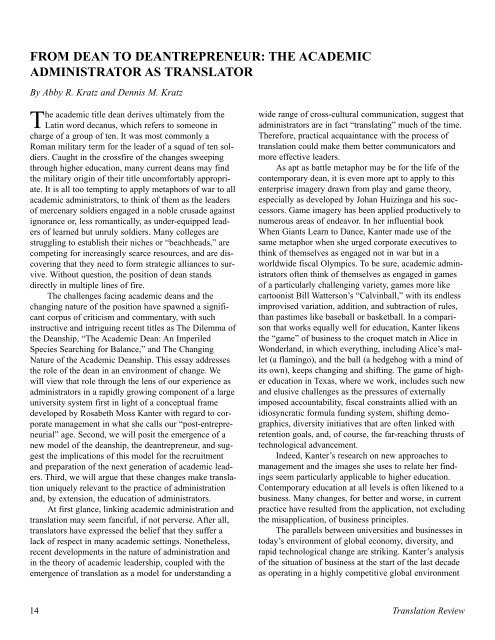Translation Review - The University of Texas at Dallas
Translation Review - The University of Texas at Dallas
Translation Review - The University of Texas at Dallas
- No tags were found...
You also want an ePaper? Increase the reach of your titles
YUMPU automatically turns print PDFs into web optimized ePapers that Google loves.
FROM DEAN TO DEANTREPRENEUR: THE ACADEMICADMINISTRATOR AS TRANSLATORBy Abby R. Kr<strong>at</strong>z and Dennis M. Kr<strong>at</strong>z<strong>The</strong> academic title dean derives ultim<strong>at</strong>ely from theL<strong>at</strong>in word decanus, which refers to someone incharge <strong>of</strong> a group <strong>of</strong> ten. It was most commonly aRoman military term for the leader <strong>of</strong> a squad <strong>of</strong> ten soldiers.Caught in the crossfire <strong>of</strong> the changes sweepingthrough higher educ<strong>at</strong>ion, many current deans may findthe military origin <strong>of</strong> their title uncomfortably appropri<strong>at</strong>e.It is all too tempting to apply metaphors <strong>of</strong> war to allacademic administr<strong>at</strong>ors, to think <strong>of</strong> them as the leaders<strong>of</strong> mercenary soldiers engaged in a noble crusade againstignorance or, less romantically, as under-equipped leaders<strong>of</strong> learned but unruly soldiers. Many colleges arestruggling to establish their niches or “beachheads,” arecompeting for increasingly scarce resources, and are discoveringth<strong>at</strong> they need to form str<strong>at</strong>egic alliances to survive.Without question, the position <strong>of</strong> dean standsdirectly in multiple lines <strong>of</strong> fire.<strong>The</strong> challenges facing academic deans and thechanging n<strong>at</strong>ure <strong>of</strong> the position have spawned a significantcorpus <strong>of</strong> criticism and commentary, with suchinstructive and intriguing recent titles as <strong>The</strong> Dilemma <strong>of</strong>the Deanship, “<strong>The</strong> Academic Dean: An ImperiledSpecies Searching for Balance,” and <strong>The</strong> ChangingN<strong>at</strong>ure <strong>of</strong> the Academic Deanship. This essay addressesthe role <strong>of</strong> the dean in an environment <strong>of</strong> change. Wewill view th<strong>at</strong> role through the lens <strong>of</strong> our experience asadministr<strong>at</strong>ors in a rapidly growing component <strong>of</strong> a largeuniversity system first in light <strong>of</strong> a conceptual framedeveloped by Rosabeth Moss Kanter with regard to corpor<strong>at</strong>emanagement in wh<strong>at</strong> she calls our “post-entrepreneurial”age. Second, we will posit the emergence <strong>of</strong> anew model <strong>of</strong> the deanship, the deantrepreneur, and suggestthe implic<strong>at</strong>ions <strong>of</strong> this model for the recruitmentand prepar<strong>at</strong>ion <strong>of</strong> the next gener<strong>at</strong>ion <strong>of</strong> academic leaders.Third, we will argue th<strong>at</strong> these changes make transl<strong>at</strong>ionuniquely relevant to the practice <strong>of</strong> administr<strong>at</strong>ionand, by extension, the educ<strong>at</strong>ion <strong>of</strong> administr<strong>at</strong>ors.At first glance, linking academic administr<strong>at</strong>ion andtransl<strong>at</strong>ion may seem fanciful, if not perverse. After all,transl<strong>at</strong>ors have expressed the belief th<strong>at</strong> they suffer alack <strong>of</strong> respect in many academic settings. Nonetheless,recent developments in the n<strong>at</strong>ure <strong>of</strong> administr<strong>at</strong>ion andin the theory <strong>of</strong> academic leadership, coupled with theemergence <strong>of</strong> transl<strong>at</strong>ion as a model for understanding awide range <strong>of</strong> cross-cultural communic<strong>at</strong>ion, suggest th<strong>at</strong>administr<strong>at</strong>ors are in fact “transl<strong>at</strong>ing” much <strong>of</strong> the time.<strong>The</strong>refore, practical acquaintance with the process <strong>of</strong>transl<strong>at</strong>ion could make them better communic<strong>at</strong>ors andmore effective leaders.As apt as b<strong>at</strong>tle metaphor may be for the life <strong>of</strong> thecontemporary dean, it is even more apt to apply to thisenterprise imagery drawn from play and game theory,especially as developed by Johan Huizinga and his successors.Game imagery has been applied productively tonumerous areas <strong>of</strong> endeavor. In her influential bookWhen Giants Learn to Dance, Kanter made use <strong>of</strong> thesame metaphor when she urged corpor<strong>at</strong>e executives tothink <strong>of</strong> themselves as engaged not in war but in aworldwide fiscal Olympics. To be sure, academic administr<strong>at</strong>ors<strong>of</strong>ten think <strong>of</strong> themselves as engaged in games<strong>of</strong> a particularly challenging variety, games more likecartoonist Bill W<strong>at</strong>terson’s “Calvinball,” with its endlessimprovised vari<strong>at</strong>ion, addition, and subtraction <strong>of</strong> rules,than pastimes like baseball or basketball. In a comparisonth<strong>at</strong> works equally well for educ<strong>at</strong>ion, Kanter likensthe “game” <strong>of</strong> business to the croquet m<strong>at</strong>ch in Alice inWonderland, in which everything, including Alice’s mallet(a flamingo), and the ball (a hedgehog with a mind <strong>of</strong>its own), keeps changing and shifting. <strong>The</strong> game <strong>of</strong> highereduc<strong>at</strong>ion in <strong>Texas</strong>, where we work, includes such newand elusive challenges as the pressures <strong>of</strong> externallyimposed accountability, fiscal constraints allied with anidiosyncr<strong>at</strong>ic formula funding system, shifting demographics,diversity initi<strong>at</strong>ives th<strong>at</strong> are <strong>of</strong>ten linked withretention goals, and, <strong>of</strong> course, the far-reaching thrusts <strong>of</strong>technological advancement.Indeed, Kanter’s research on new approaches tomanagement and the images she uses to rel<strong>at</strong>e her findingsseem particularly applicable to higher educ<strong>at</strong>ion.Contemporary educ<strong>at</strong>ion <strong>at</strong> all levels is <strong>of</strong>ten likened to abusiness. Many changes, for better and worse, in currentpractice have resulted from the applic<strong>at</strong>ion, not excludingthe misapplic<strong>at</strong>ion, <strong>of</strong> business principles.<strong>The</strong> parallels between universities and businesses intoday’s environment <strong>of</strong> global economy, diversity, andrapid technological change are striking. Kanter’s analysis<strong>of</strong> the situ<strong>at</strong>ion <strong>of</strong> business <strong>at</strong> the start <strong>of</strong> the last decadeas oper<strong>at</strong>ing in a highly competitive global environment14 <strong>Transl<strong>at</strong>ion</strong> <strong>Review</strong>
















